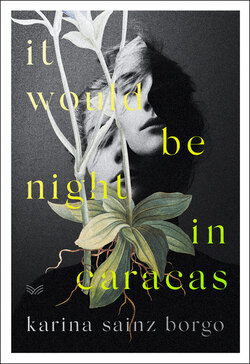Читать книгу It Would Be Night in Caracas - Karina Sainz Borgo - Страница 15
ОглавлениеMY MOTHER’S BELONGINGS were, finally, in boxes to one side of the home library. They looked like baggage that time had packed behind our backs. I resisted the urge to give away or donate all of it. I didn’t intend to leave a single page, length of fabric, or splinter of wood to this doomed country going up in flames.
The days accumulated like the dead in the headlines. The Sons of the Revolution tightened the screws. They gave us reason to go out in the street, and all the while the state-sponsored bodies and armed cells repressed those who did, acting in groups with their faces covered, cleansing the pavements. No one was completely safe in their homes. Outside, in the jungle, methods to neutralize opponents reached an unprecedented degree of finesse. Across the nation the only thing in working order was the killing and stealing machine, the pillaging apparatus. I watched them grow and become part of the cityscape, just another feature of everyday life: a presence camouflaged in the disorder and chaos, protected and nourished by the Revolution.
Almost all the militias were made up of civilians. They acted under police protection. They started congregating by the trash heap at Plaza del Comandante, which we were still calling by its original name: Plaza Miranda, a tribute to the only truly liberal figure of our War of Independence, who died, like other good and just men, far from the country he’d given his all. That was where the Sons of the Revolution chose to establish their new command. Sons? I thought. And why not bastards? “Bastards of the Revolution,” I murmured on seeing a troupe of obese women, all dressed in red. They looked like a family. A gynoecium of roly-poly nymphs: fathers and brothers who were really mothers and sisters. Vestals armed with buckets of water and sticks, femininity in all its splendor and at its most bizarre.
The first day, a convoy of ten soldiers—faceless thanks to dark helmets with skull smiles—camped next to them. After a few weeks, more arrived. All the while more members of the Fatherland’s Motorized Fleet turned up. It was impossible to identify them. They wore the masks used by riot police. The lower half of the face was covered with the smiling jawbone of a skeleton and, at the height of the eyes, a piece of rubber was bored with holes. Why did they take such pains to hide their identity when the law was in their hands?
In contrast, the women showed their faces, baring their teeth like menacing dogs. They fought more fiercely. They landed punches. Once they’d managed to bring down an opponent, they dragged him along the ground and stripped him of everything. Everyone carried out their labors with immense gusto, though I never managed to understand what salary could be so high that their fury never abated. What did they get in exchange for the full-time job of smashing heads in as if they were melons? Our days were numbered.
